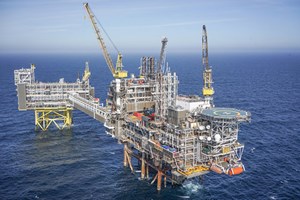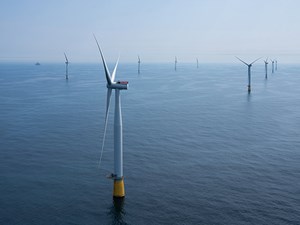Mixed outlook for activity on the UK Continental Shelf
The year 2023 has exhibited mixed fortunes for oil-and-gas-related activity on the UK Continental Shelf (UKCS). Production of both oil and gas declined, compared to 2022. Aggregate production for 2023 is now estimated at 1.23 MMboed. Capital expenditure increased somewhat to £4.8 billion, and operating costs rose to £8.7 billion. But this reflects cost inflation, which has now become widespread in construction-related activities, though hopefully at reduced rates.
Regulatory environment. Heated political debates on policies toward the sector continued apace throughout 2023. The Energy Profits Levy (Windfall Tax) produced substantial revenues to the state, as its high rate of 35% became effective. The overall headline tax rate became 75% in 2023. Substantial investment allowances also constitute a major feature of the overall tax system, but financial constraints and opportunities in other overseas oil provinces have curtailed investment on the UKCS.
The ongoing political debate reveals fundamental policy differences toward the sector. Thus, the UK government is keen to encourage further exploration, development and production. To this end, it has announced plans to have annual licensing rounds. It is noteworthy that existing legislation permits the government to issue licenses whenever this is deemed to be appropriate.
Licensing regime. A main element behind the licensing initiative is to enhance security of supply, as the UK currently is a large net importer of both oil and gas. The increased uncertainty regarding imports of gas, in particular, following the Russia-Ukraine war has been the main motivating factor. It is noteworthy that very substantial environmental hurdles have to be surmounted before both exploration licenses and field development consents are awarded. Recent regulatory announcements highlight the necessity of reducing carbon emissions in the production process.
Opposition political parties are lukewarm on the new licensing initiatives, highlighting the potential extra emissions from oil and gas operations. In the heated debate, it has been argued that most of North Sea oil production is likely to be exported. But this ignores the fact that, the larger the volume of exports, the greater will be the consequential net import requirements.

Slight decline seen for 2024. For the year, 2024, the projections of the North Sea Transition Authority (NSTA), the industry regulator, indicate a slight fall in both oil and gas production, to a combined total of 1.15 MMboed, Fig. 1. This will result in increased import requirements, when set in the context of the projections of UK consumption made by the independent Climate Change Committee. The Climate Change Committee is the independent adviser to the UK government on emissions targets necessary to meet the Transition to Net Zero by 2050, a target to which the UK is legally committed. It is also noteworthy that the projections of expenditure in the oil and gas sector made by the industry regulator, NSTA, are lower than the 2023 estimate.
Offshore wind is expanding. But, as far as overall activity on the UKCS is concerned, this is not the end of story. Currently, investment in offshore wind is increasing. Growth is anticipated to accelerate in 2024, perhaps reaching £7 billion, Fig. 2. These investments relate to both fixed and floating facilities.

Equinor has already pioneered the development of a floating offshore wind farm, using FPSO technology originally used to produce oil and gas. Over the longer term, it is expected that investment in offshore wind project will increase substantially. Thus, Offshore Energies UK (the oil sector’s trade association) has made informed projections that in the year 2030, investment in offshore wind on the UKCS could be around £14 billion at 2022 prices.
The regulatory framework for investment in wind farms is still being developed and revised. Thus, the incentive scheme—whereby generators of electricity from offshore wind farms receive a favourable price—was recently revised upwards to take into account the escalation in construction costs. It is anticipated that such problems will be overcome, as there is general political agreement that these developments should be incentivised to reduce CO2 emissions from fossil fuel-related electricity generation.
Employment and local content. As far as employment in the whole offshore sector is concerned, the expected growth from wind farm developments comes at a critical time. In recent years employment in the oil and gas sector has fallen with the reduced investment and production. It is clear that many of the construction and installation skills are transferable to offshore wind developments. Already, many supply chain contractor companies have rebranded themselves to highlight the skills relating to offshore wind installations.
A live, current issue relates to the UK content of the offshore wind projects. This is reminiscent of the debates that occurred in the 1970s, regarding the local content for oil and gas development activities. Currently, a large element of the value-added in wind farm projects, notably the construction of the turbines, emanates from the overseas countries, such as Denmark and Germany. Currently, there is no clearly defined UK policy on local content, such as was developed for the oil and gas sector. In the 1970s, this involved very substantial controversies, but a clearer policy for offshore wind deserves more attention.
The UKCS will be used for other energy-related activities, such as carbon capture utilisation and storage. Progress is now being made on these projects, including much government support. The UKCS has a substantial number of unused pipelines and reservoirs, but the investment costs remain high. Activity in this area should increase over the medium and longer terms.

- Regional report: Guyana-Suriname: Rapid expansion of production continues (July 2024)
- Annular safety valves advance flexibility, reliability and safety in completion operations (July 2024)
- Executive viewpoint (June 2024)
- Oil and gas in the Capitals (June 2024)
- First oil (June 2024)
- Redefining oil & gas investments beyond conventional financial systems (June 2024)


